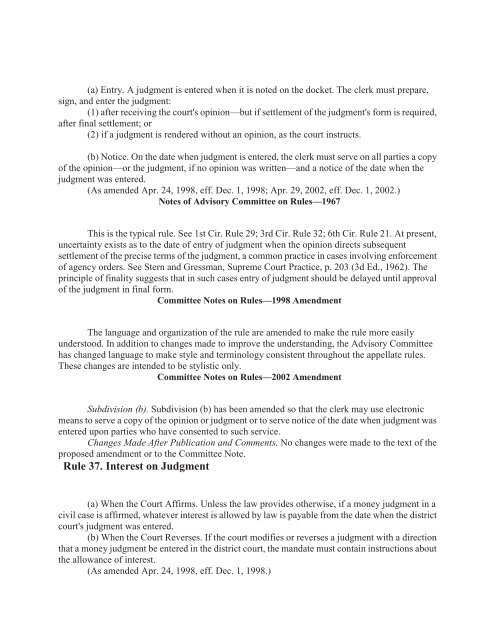Federal Rules of Appellate Procedure 2014-2015, 2014a
Federal Rules of Appellate Procedure 2014-2015, 2014a
Federal Rules of Appellate Procedure 2014-2015, 2014a
Create successful ePaper yourself
Turn your PDF publications into a flip-book with our unique Google optimized e-Paper software.
(a) Entry. A judgment is entered when it is noted on the docket. The clerk must prepare,<br />
sign, and enter the judgment:<br />
(1) after receiving the court's opinion—but if settlement <strong>of</strong> the judgment's form is required,<br />
after final settlement; or<br />
(2) if a judgment is rendered without an opinion, as the court instructs.<br />
(b) Notice. On the date when judgment is entered, the clerk must serve on all parties a copy<br />
<strong>of</strong> the opinion—or the judgment, if no opinion was written—and a notice <strong>of</strong> the date when the<br />
judgment was entered.<br />
(As amended Apr. 24, 1998, eff. Dec. 1, 1998; Apr. 29, 2002, eff. Dec. 1, 2002.)<br />
Notes <strong>of</strong> Advisory Committee on <strong>Rules</strong>—1967<br />
This is the typical rule. See 1st Cir. Rule 29; 3rd Cir. Rule 32; 6th Cir. Rule 21. At present,<br />
uncertainty exists as to the date <strong>of</strong> entry <strong>of</strong> judgment when the opinion directs subsequent<br />
settlement <strong>of</strong> the precise terms <strong>of</strong> the judgment, a common practice in cases involving enforcement<br />
<strong>of</strong> agency orders. See Stern and Gressman, Supreme Court Practice, p. 203 (3d Ed., 1962). The<br />
principle <strong>of</strong> finality suggests that in such cases entry <strong>of</strong> judgment should be delayed until approval<br />
<strong>of</strong> the judgment in final form.<br />
Committee Notes on <strong>Rules</strong>—1998 Amendment<br />
The language and organization <strong>of</strong> the rule are amended to make the rule more easily<br />
understood. In addition to changes made to improve the understanding, the Advisory Committee<br />
has changed language to make style and terminology consistent throughout the appellate rules.<br />
These changes are intended to be stylistic only.<br />
Committee Notes on <strong>Rules</strong>—2002 Amendment<br />
Subdivision (b). Subdivision (b) has been amended so that the clerk may use electronic<br />
means to serve a copy <strong>of</strong> the opinion or judgment or to serve notice <strong>of</strong> the date when judgment was<br />
entered upon parties who have consented to such service.<br />
Changes Made After Publication and Comments. No changes were made to the text <strong>of</strong> the<br />
proposed amendment or to the Committee Note.<br />
Rule 37. Interest on Judgment<br />
(a) When the Court Affirms. Unless the law provides otherwise, if a money judgment in a<br />
civil case is affirmed, whatever interest is allowed by law is payable from the date when the district<br />
court's judgment was entered.<br />
(b) When the Court Reverses. If the court modifies or reverses a judgment with a direction<br />
that a money judgment be entered in the district court, the mandate must contain instructions about<br />
the allowance <strong>of</strong> interest.<br />
(As amended Apr. 24, 1998, eff. Dec. 1, 1998.)


















